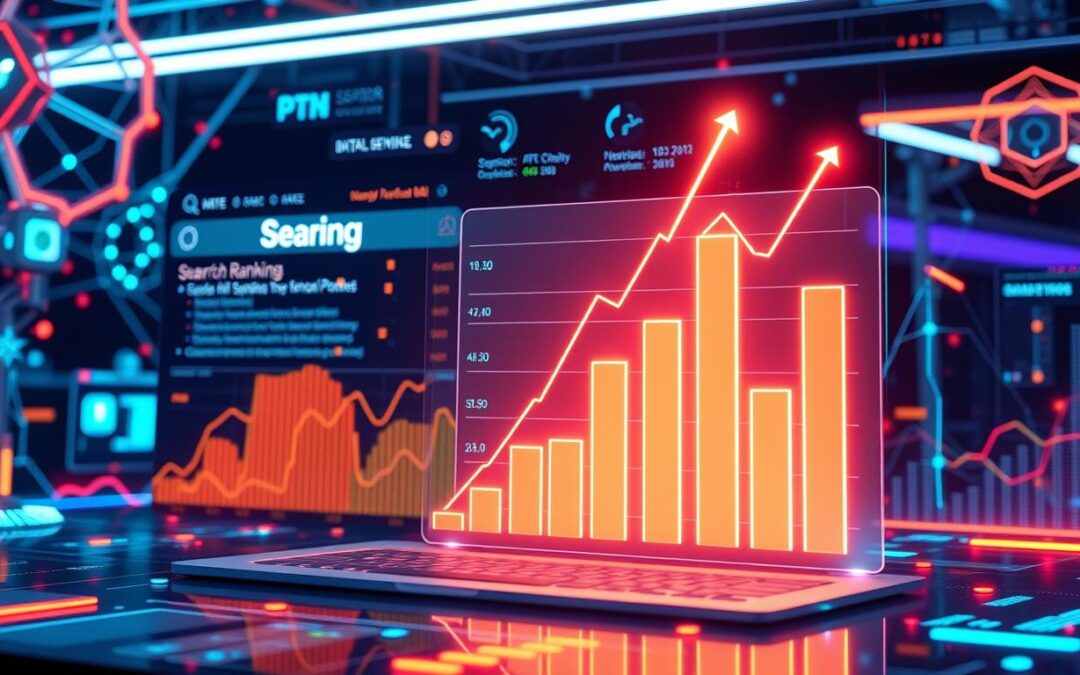Imagine using artificial intelligence to make your website a top search result. In today’s digital world, AI SEO tools could be your secret weapon. With 84% of SEO experts using AI, the future of SEO is changing fast.
Starting with AI for SEO can feel daunting. But finding the right tools is key. These tools automate tasks, analyze data quickly, and improve content. Yet, human touch is still essential.
Marketers save about 12.5 hours a week with AI. That’s over a month more work each year. Whether you’re small or big, knowing AI’s value in SEO is important. Prices range from $99 to over $3,000, but the benefits are worth it.
Key Takeaways
- AI SEO tools are a transformative force, reshaping search rankings and SEO workflows.
- Choosing the right AI tool depends on your strategic needs and budget parameters.
- On average, integrating AI into SEO saves marketers roughly 12.5 hours per week—amounting to an extra month of productivity per year.
- AI for SEO isn’t just for the tech-giants—accessible pricing tiers allow for scalability regardless of company size.
- Brands like HubSpot utilize AI to optimize content, strategize SEO, and enhance overall marketing efficiency.
- Investment in AI SEO varies, but a thorough ROI analysis reveals the holistic benefits beyond upfront costs.
- Training and upskilling employees is also a vital part of leveraging AI SEO tools effectively.
Embracing AI for SEO: The Transformative Impact on Digital Marketing
AI is changing digital marketing for businesses. It makes content better and SEO strategies more effective. This helps content match what users want and what search engines look for.
How AI Tools Complement Human Creativity in Content Strategy
AI does more than just automate tasks. It boosts human creativity too. Tools like MarketMuse use AI to suggest content ideas. This mix of AI and human touch makes content better for search engines and readers.
From Analysis to Action: AI’s Role in Data-Driven SEO Decisions
Data is crucial in SEO, and AI quickly analyzes it. This lets businesses adjust their SEO plans fast. Salesforce’s Einstein AI helps personalize user experiences, which is key for SEO success.
Realizing the Potential: Case Studies of AI Amplifying SEO Outcomes
Companies using AI in SEO see big improvements in rankings. Google’s RankBrain and DeepMind are examples of AI’s power. They make search results more personal and efficient. AI also helps businesses quickly adapt to market changes.
AI has huge potential for SEO and content optimization. It helps businesses predict trends and quickly adjust to the digital market. This shift from old SEO methods to AI-driven ones is crucial for success.
This move to AI doesn’t replace human input. It makes it more powerful. As digital marketing gets more complex, AI is key for staying ahead.
The Mechanics of AI for SEO: Advancing Beyond Traditional Tactics
AI in SEO is more than just making things automatic. It’s about making search optimization smarter and more precise. Google’s RankBrain and BERT show how AI understands what users want and makes search results better.
AI tools dig deep into big data to find insights we couldn’t see before. They help us make better decisions based on data. For example, AI can look at what users say and how well a page performs. It then suggests changes to make the content better for users, improving both engagement and search rankings.
AI in SEO doesn’t replace human skills; it helps by doing the repetitive work. This lets SEO experts focus on creative and strategic work. AI and human insight work together, keeping SEO strategies strong and relevant.

AI is changing SEO by making content more personal through machine learning. It understands and predicts what users will like, making content more engaging. This not only keeps users interested but also builds loyalty to the brand.
Using AI tools like Google’s MUM and Passage Ranking also helps refine search queries and content. This makes the user experience better and improves site rankings in different languages and regions. AI’s ability to handle huge amounts of data leads to more advanced SEO strategies.
To learn more about AI’s impact on SEO, check out this detailed analysis on generative search platforms like Google’s Search Generative.
Using AI in SEO is taking us beyond old ways and towards a future where digital marketing is smarter and more focused on users. The possibilities for AI in SEO are endless, promising new ways to improve search engine optimization.
ai for SEO: Crafting Content That Ranks with Machine Learning
AI is changing how marketers improve their online presence. It’s making content creation and search better. This is key for businesses to stay ahead.
Understanding Natural Language Processing for Superior Content Optimization
Natural language processing (NLP) is key in making content better. It analyzes text to understand what it means. This helps SEO tools make content that people and search engines like.
By using AI, brands can make stories that grab attention. They also follow SEO rules well. Tools like SEMrush and Moz show this.
Leveraging Entity Recognition and Topic Modeling to Drive Visibility
AI helps find important topics and entities in text. This is thanks to entity recognition and topic modeling. Tools like Ahrefs and SEMrush use this to suggest better content.
AI looks at keywords and themes. This makes content easier to find and more appealing to the right people.
Utilizing AI for Semantic Search Enhancement
AI makes search engines understand what we mean when we search. Tools like Yext and Localo make content better for search. They focus on matching what we’re looking for, not just keywords.
This leads to better search results. People are happier and more engaged when they find what they’re looking for.
Using AI in SEO makes things easier and better. It helps search technology get even smarter. This means success for those who use these tools well.
Optimization at Scale: How AI Revolutionizes Technical SEO Audits
Digital landscapes are getting more complex. This makes scaling SEO audits and technical SEO crucial. AI is key in making these processes more efficient. It automates site checks, finding issues like broken links and slow loading times.
AI in technical SEO does more than just find problems. It offers solutions that boost traffic and user engagement. For example, CNET and Bankrate saw huge increases in organic visits thanks to AI. To see how AI can improve your digital marketing, check out AI’s role in SEO.
| SEO Task | Impact of AI | Quantitative Benefit |
|---|---|---|
| Automated Testing and Improvements | Refines underperforming areas | 49.2% improvement in rankings |
| Content Optimization | Aligns content with search engine algorithms | 20k to 125k organic visits |
| Technical Audits | Identifies and resolves site issues | Improvements in site health and SEO |
Tools like Semrush’s Site Audit help spot issues with Core Web Vitals. They also show how to fix these problems to improve site performance. AI tools like TensorFlow and PyTorch manage big data, helping create SEO strategies that meet current and future search engine standards.
AI’s role in technical SEO and automated optimization is huge. It simplifies complex tasks, turns data into action, and makes SEO strategies strong. By using AI, marketers can keep up with the fast-changing digital world.
Conclusion
AI for SEO is changing digital marketing. It combines technology and human skills to improve search rankings. AI helps with technical audits, content creation, and SEO tasks, making online visibility change fast.
Businesses need to use AI for SEO to stay ahead. It’s key for keeping up with the competition and giving users a great experience.
New data shows AI Overviews are becoming common in search results. Over 25% of search results now include these summaries, using 5.4 external sources on average. This means businesses should adjust their content to include AI elements to boost their online presence.
Tools like SEMrush make it easier to create original content. They help align with E-E-A-T principles. It’s crucial to use AI advancements to stay relevant online.
Being adaptable is essential. Alex Bider, CEO of 2Marketing.com, says using AI for SEO is a smart move. The search world is full of chances, from voice search to Google’s dominance. It’s time to take action.
As search engines get smarter, so must our SEO strategies. We need to be not just seen but also valuable in the fast-changing digital world.
